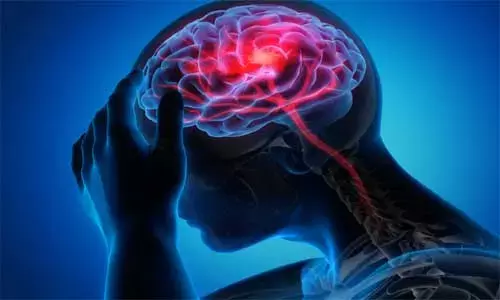- Home
- Medical news & Guidelines
- Anesthesiology
- Cardiology and CTVS
- Critical Care
- Dentistry
- Dermatology
- Diabetes and Endocrinology
- ENT
- Gastroenterology
- Medicine
- Nephrology
- Neurology
- Obstretics-Gynaecology
- Oncology
- Ophthalmology
- Orthopaedics
- Pediatrics-Neonatology
- Psychiatry
- Pulmonology
- Radiology
- Surgery
- Urology
- Laboratory Medicine
- Diet
- Nursing
- Paramedical
- Physiotherapy
- Health news
- Fact Check
- Bone Health Fact Check
- Brain Health Fact Check
- Cancer Related Fact Check
- Child Care Fact Check
- Dental and oral health fact check
- Diabetes and metabolic health fact check
- Diet and Nutrition Fact Check
- Eye and ENT Care Fact Check
- Fitness fact check
- Gut health fact check
- Heart health fact check
- Kidney health fact check
- Medical education fact check
- Men's health fact check
- Respiratory fact check
- Skin and hair care fact check
- Vaccine and Immunization fact check
- Women's health fact check
- AYUSH
- State News
- Andaman and Nicobar Islands
- Andhra Pradesh
- Arunachal Pradesh
- Assam
- Bihar
- Chandigarh
- Chattisgarh
- Dadra and Nagar Haveli
- Daman and Diu
- Delhi
- Goa
- Gujarat
- Haryana
- Himachal Pradesh
- Jammu & Kashmir
- Jharkhand
- Karnataka
- Kerala
- Ladakh
- Lakshadweep
- Madhya Pradesh
- Maharashtra
- Manipur
- Meghalaya
- Mizoram
- Nagaland
- Odisha
- Puducherry
- Punjab
- Rajasthan
- Sikkim
- Tamil Nadu
- Telangana
- Tripura
- Uttar Pradesh
- Uttrakhand
- West Bengal
- Medical Education
- Industry
Aspirin ticagrelor combo reduces stroke, death risk in TIA patients: NEJM

USA: Ticagrelor-aspirin versus aspirin alone reduced the risk of the composite of stroke or death within 30 days in patients with mild-to-moderate acute noncardioembolic ischemic stroke or TIA, finds a recent study. The study, published in the New England Journal of Medicine, further found that the incidence of disability did not differ significantly between the two groups and severe bleeding was more frequent with ticagrelor.
Previous studies have evaluated the use of clopidogrel and aspirin for stroke prevention after a transient ischemic attack (TIA) or ischemic stroke. Ticagrelor was not found to be better than aspirin in preventing death or vascular events after stroke or TIA. The effect of the combination of ticagrelor and aspirin has not been studied well.
S. Claiborne Johnston, the University of Texas at Austin, Austin, Texas, and colleagues assessed the safety and efficacy of dual antiplatelet therapy (DAPT) with aspirin and ticagrelor compared with aspirin alone among patients with acute noncardioembolic ischemic stroke.
For the purpose, they conducted a randomized, placebo-controlled, double-blind trial. It involved patients who had a mild-to-moderate acute noncardioembolic ischemic stroke, with a National Institutes of Health Stroke Scale (NIHSS) score of 5 or less (range, 0 to 42, with higher scores indicating more severe stroke), or TIA and who were not undergoing thrombolysis or thrombectomy. They were assigned in the ratio 1:1 to receive a 30-day regimen of either ticagrelor (180-mg loading dose followed by 90 mg twice daily) plus aspirin (300 to 325 mg on the first day followed by 75 to 100 mg daily) or matching placebo plus aspirin, within 24 hours after symptom onset.
The primary outcome was a composite of stroke or death within 30 days. Secondary outcomes were the first subsequent ischemic stroke and the incidence of disability within 30 days. The primary safety outcome was severe bleeding.
A total of 11,016 patients underwent randomization (5523 in the ticagrelor–aspirin group and 5493 in the aspirin group).
Key findings of the study include:
- A primary-outcome event occurred in 303 patients (5.5%) in the ticagrelor–aspirin group and in 362 patients (6.6%) in the aspirin group (hazard ratio, 0.83).
- Ischemic stroke occurred in 276 patients (5.0%) in the ticagrelor–aspirin group and in 345 patients (6.3%) in the aspirin group (hazard ratio, 0.79).
- The incidence of disability did not differ significantly between the two groups.
- Severe bleeding occurred in 28 patients (0.5%) in the ticagrelor–aspirin group and in 7 patients (0.1%) in the aspirin group.
"Among patients with a mild-to-moderate acute noncardioembolic ischemic stroke (NIHSS score ≤5) or TIA who were not undergoing intravenous or endovascular thrombolysis, the risk of the composite of stroke or death within 30 days was lower with ticagrelor–aspirin than with aspirin alone, but the incidence of disability did not differ significantly between the two groups. Severe bleeding was more frequent with ticagrelor," concluded the authors.
The study, "Ticagrelor and Aspirin or Aspirin Alone in Acute Ischemic Stroke or TIA," is published in the journal NEJM.
Dr Kamal Kant Kohli-MBBS, DTCD- a chest specialist with more than 30 years of practice and a flair for writing clinical articles, Dr Kamal Kant Kohli joined Medical Dialogues as a Chief Editor of Medical News. Besides writing articles, as an editor, he proofreads and verifies all the medical content published on Medical Dialogues including those coming from journals, studies,medical conferences,guidelines etc. Email: drkohli@medicaldialogues.in. Contact no. 011-43720751


